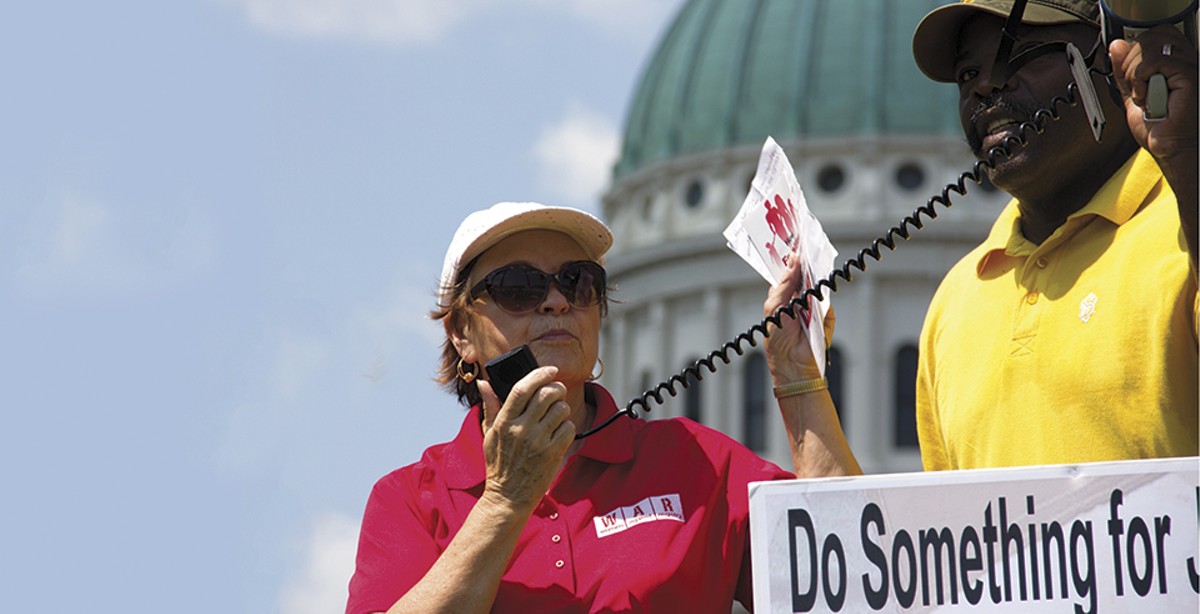Four hours into the armed standoff, the narrow residential street in Arnold is crowded with police cruisers, ambulances and SWAT trucks. Two TV news crews set up in someone's front lawn, training their camera lenses on a boxy armored personnel carrier parked outside a one-floor duplex on West Highview Drive.
A TV reporter relays in a breaking news update that federal officials would not release any information about the suspect, only that the man is believed to be armed and that FBI agents arrived at the home around 7 a.m. to serve a search warrant for "a court-authorized law enforcement purpose."
A neighbor evacuated from her home sits on a lawn chair in a patch of shade, smoking a cigarette. Yes, she says, she knows the woman who lives in the duplex. She doesn't mention the woman's name, but it's Vicki Henry.
"We'd just chitchat at the mailbox," the neighbor says. "She told me a while back, 'I have one of my sons staying with me. It's a shame, a divorce situation.'"
The neighbor adds, "I wouldn't see hide nor hair of the son."
She doesn't know the full story. Henry's son, "Joseph," had indeed moved into his mother's duplex several months back, but he wasn't reeling from a divorce. He was a former Marine who'd been convicted of possessing child pornography. After spending four years in a military prison and treatment center, he'd tried to reestablish his life. He got a job, met someone, fell in love, and, even knowing his past, she did too. For a time, Joseph lived with his girlfriend and her children.
Then one of her relatives discovered his name on the sex offender registry. The law didn't technically bar him from being near the kids; even so, the kids' father obtained a restraining order. So Joseph restarted his life, again. He moved in with his mom earlier this year. He worked nights and kept to himself.
And yet, as he finds himself in a standoff with FBI agents, his mother, Henry, is nowhere near the congested street.
The president of Women Against Registry, or WAR, Henry has spent the last six years pushing to reform the way Missouri and other states maintain sex offender registries, systems that she believes are misguided and undeniably oppressive for both registrants and their suffering families. Living off her retirement savings, she travels across the country, attending conferences, giving speeches and testifying before various state legislatures — and she does so, uniquely, using her real name. Unlike most parents in her position, she doesn't hide who she is, what she believes or what the registry has meant for her family.
She hasn't taken a proper vacation in years. A weekend trip to North Carolina was supposed to change that.
The timing couldn't have been worse. Hearing about the situation unfolding at her house, she's turned around and is heading home as fast as she can. Now she's got more than ten hours of driving before she hits the Missouri border.
Henry can only stare at the road, squeeze the steering wheel and pray.
Two months before the FBI standoff, on a Saturday in July, a father with a son on the sex offender registry taps at the microphone jutting from a podium in a banquet hall at a St. Louis Sheraton Hotel. He announces the official opening of Women Against Registry's first-ever national conference. Behind him, a 10-foot-tall banner displays WAR's red-and-white logo. The provocative acronym is printed in a font that looks like the letters were drilled full of rivet holes. The room is far too large for the 60 or so people who have dragged themselves out of bed to be here before 9 a.m.
No one appears concerned that a man is delivering the opening remarks for an organization with the word "women" in its title. Although WAR grew out of a now-defunct support group founded by the mothers and spouses of sex offenders, the organization doesn't turn away allies.
The man reassures the audience that they aren't being filmed or photographed. There is no registration fee to be here, but the event was barely publicized. An official press release was distributed only days before. Riverfront Times was permitted to attend and report on the conference on the condition that attendees would not be photographed or named without their consent. No one gives it other than Henry.
We'll call the man at the podium "Adam." Like the other volunteers working the conference, he wears a red T-shirt with the conference theme stenciled in white on the back: "our families, our future, our time." Henry, dressed in a gray and green blazer that matches her top, stands out from the others. She listens to Adam's speech from the rear of the room.
"I am relatively new to WAR," Adam begins. "My beautiful, intelligent, creative son was caught in a bait-and-switch sting operation a little more than two years ago. There was never any physical contact with anyone. There was never a victim. We felt as if we were backed into a corner when we accepted a plea bargain."
He doesn't have to say the words "child porn." Everyone knows what he's talking about. "My son was sentenced to fourteen years in a federal prison," he continues, and a wave of sympathetic murmurs washes over him. "The disparity between the sex offender sentences and the sentences of other crimes is outrageous."
"Amen!" shouts a woman from the audience. Adam blasts the imposition of lifetime registration and lifetime probation, a fate his son may face after leaving prison, as "double and triple punishment" and "unconstitutional." The audience applauds.






